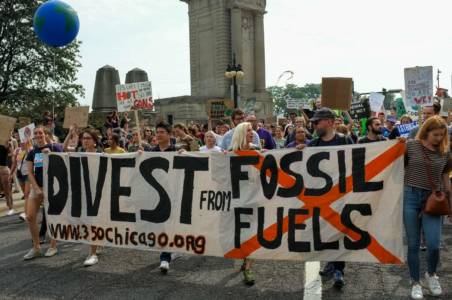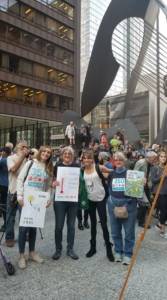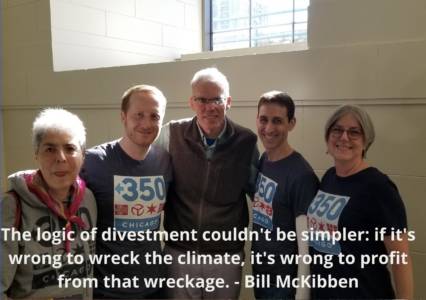This spring Chicago became the third largest City in the US to divest its operating budget from fossil fuels. It joins New York, Los Angeles, Minneapolis, Boston, San Francisco, Kansas City, Seattle, Santa Fe, San Diego, San Jose. This moment is important not only because Chicago is a large and prominent city in the U.S. and internationally, but because it sets an example for the region. Other midwestern divestment and defund groups will be holding Chicago up as an example, as will environmental justice communities and organizations, and progressive legislators. Though Chicago is not yet a progressive city, and local environmental organizations are not yet able to rely on a broad like-minded constituency, the work of organizations like 350 Chicago and its various allies has changed the culture of the city forever. We have certainly won a victory in the City’s divestment from fossil fuels, but we have won another and perhaps more important victory. We have educated and raised the moral consciousness of our leadership and our neighbors for the benefit of the city’s most vulnerable citizens and for the benefit of future generations.
Why divestment?
While some environmental activists think of divestment as a marginal issue, 350 Chicago, since its birth in 2014, has understood the basic problem of supporting and profiting from fossil fuel investments while the world suffers the myriad unintended consequences of climate change. As Bill McKibben has made clear, if polluting is wrong, then profiting from polluting is also wrong. Over the past 8 years 350 Chicago has played a role in changing the culture of Chicago and City government. We have a long way to catch up with progressive cities like Los Angeles and New York but Chicagoans have recently signaled their recognition of the deep moral inconsistencies between investing in fossil fuels and fighting for environmental justice issues such as respiratory health and extreme weather resilience.
Some local history . . .
At the beginning of our campaign, the City government was, at best, apathetic to the issue of divestment. At worst, it consciously sacrificed environmental causes to win other victories or balance the budget. Among the low points was the dissolution of the Department of the Environment in 2011 by Rahm Emanuel and a 2017 GHG emissions report that confirmed the city’s failure to rapidly reduce its greenhouse gas emissions. In 2005, Chicago measured 36.2 million metric tons of greenhouse gas emissions per year. The goal was to reduce that number to 24.2 million metric tons by 2020, but the 2017 data showed the city was less than halfway to its goal.
In 2018 the City introduced an ESG ordinance under the direction of past City Treasurer Kurt Summers. This was a kind of a consolation for 350 Chicago but also a shortfall. Although the treasurer at the time insisted ESG was better than divestment because it also addressed social and governance issues, the ordinance did not send a clear moral message about fossil fuel investments. Also, as has been made clear by the SEC and the G7, due to insufficient oversight in the past, ESG has functioned as an umbrella under which both governments and corporations have been able to continue avoiding taking responsibility for polluting.
Ironically the election of Donald Trump, his appointment of a fossil-fuel cabinet, and withdrawal for the Paris Accords, gave American cities a mandate to take on leadership roles and keep international promises (including the Paris Accords). In the last few years cities like Los Angeles and New York have published transformational climate action plans. Each articulates the inextricable ties between environmental justice, economic justice, and social well-being. Cities are complex systems demanding solutions from parties familiar with systems thinking. 350 Chicago is such an organization.
How it finally happened!
The tide turned in favor of 350 Chicago in the 2019 municipal election. More progressive and socially-conscious alderpersons were elected, a long-time 350 Chicago ally 32nd Ward Alderman Scott Waguespack was appointed as the Chair of the City Council Committee on Finance, and Melissa Conyers-Ervin was elected as City Treasurer. We finally got the leadership we deserved, but we must also take credit for educating both leaders and their constituents since 2014.
350 Chicago crafted an addition to the ESG ordinance that mandated the City divest from top fossil fuel companies. Although the Treasurer had divested before the ordinance was passed, it was essential to pass the addition to the ordinance in order to write into law the provision that no future government could re-invest in the top 200 fossil fuel companies. The Treasurer’s office moved a step further by excluding 225 fossil fuel companies from investment by the City. The legislation was complex for various reasons including issues of subsidiaries and the challenge of identifying the top companies as the landscape changes. However, we believe the ordinance clearly articulates the City’s intentions, and that it will function as a tool for guidance and as a way to hold the City accountable in the future.
After making progress but falling short of the ultimate goal for so many years, 350 Chicago was truly heartened to hear the new Treasurer speak publicly about the need for Chicago to divest and to clearly articulate the relationship between divestment and environmental justice in Chicago. There were moments when we were afraid the day would be lost. (We heard rumors that rising fuel prices might kill the initiative because there was too much pressure to make up for previous economic losses.) With the help of local allies in City government and the testimony of powerful organizations such as Mornigstar and the UN-supported Principles for Responsible Investment however, 350 Chicago was able to send a message that continuing to profit from fossil fuels was morally indefensible. Here is an excerpt from Melissa Brice’s testimony:
Chicago citizens face grave future threats of more frequent extreme weather events, flooding, air and water pollution, social disruption, and increased health risks. Indeed, the City of Chicago has declared a state of Climate Emergency. Fossil fuel divestment is an important part of a multi-pronged effort to curb emissions. Divestment also illustrates the City Council’s recognition of the profound, cumulative health impacts of fossil fuel emissions on frontline communities.
We are proud that Chicago, the third most populous U.S. city, will be joining a growing list of local, regional, and national governments refusing to finance a greedy, destructive, and corrupt industry. Thirty-nine U.S. cities (including Los Angeles, New York, and Boston) and over 1500 institutions (including various prestigious American universities) have already divested from fossil fuels. We imagine a future in which the city of Chicago becomes a leader in the fight against climate change. Divesting City assets from fossil fuel companies is a necessary step in the right direction
It was with a mixture of shock and great joy that we witnessed the passage of the ordinance by unanimous approval on March 23rd, 2022.
Keeping the faith
This victory was the result of a very, very long campaign of which we are justifiably proud. Long ago, leadership realized we couldn’t win the fight unless we reached a large portion of the population and through as many means as possible. Since 2014, we have met with alderpersons and two city treasurers, tabled at local street festivals, held film nights, sponsored numerous panels and lectures, organized letter-writing campaigns, written editorials and white papers about the issue, organized and taken part in numberless protests, and waited outside of El stations to gather signatures on postcards and petitions. We held very small events and participated in huge protests. We worked tirelessly, rain or shine. (Every core volunteer has a story about carrying a banner in the rain and the exhilaration of marching with friends and allies.) Over these past eight years we’ve formed a strong community of volunteers and forged strong bonds with local and regional environmental organizations. Individual members have also advanced environmental justice and sustainability initiatives in a wide variety of business and institutional environments including international corporations and local universities. In short, we’ve helped to shape Chicago culture and raise the city’s collective environmental consciousness.
The founders of 350 Chicago, Melissa Brice and Larry Coble, always believed that their cause was just and that we would eventually win the day. In the words of Larry Coble, “We knew we would win, because we had to. We had to fight and win this battle for future generations. We figured, after having done our research, that our case for fossil fuel divestment would be convincing and win out.” The core volunteers have come and gone and returned as their energy and resources have allowed, but it was the faith, perseverance, and hard work of the leaders that inspired everyone to keep coming to meetings and working on the campaign.
350 Chicago would like to thank Mayor Lori Lightfoot for her leadership in introducing the ordinance, City Treasurer Melissa Conyears-Ervin and her staff for engaging in the process of creating the legislation, and all the City Aldermen 350 Chicago has met with over the years of our campaign. 350 Chicago would like to especially thank ordinance sponsors 49th Ward Alderwoman Maria Hadden, 1st Ward Alderman Daniel La Spata, 12th Ward Alderman George A. Cardenas, and 32nd Ward Alderman Scott Waguespack and each of their staff members.
We would also like to thank all the volunteers at 350 Chicago for doggedly driving this issue. If you spent any time over the last 8 years working on this issue with our organization, this is your victory!
Lastly, we would like to especially thank the support of our donors. None of this would be possible without your generous support and we wanted to say thank you, thank you, thank you!
What’s next?
The victory is not the end of our work but a great preparation for the next fight. We are building grassroots support in Chicago and Illinois to divest the state of Illinois from fossil fuels. Divestment at the state level will not only have a significant impact in terms of divestment but further help to change the culture of the region.
We are currently building grassroots support to encourage lawmakers and policymakers in the State of Illinois to pass a resolution to immediately freeze any new investments in the top 200 fossil fuel companies* and divest from direct ownership and any commingled funds that include fossil fuel public equities and corporate bonds within 5 years. Building support from pensioners and union members will pressure the Pension Boards to divest State pension money as well.
See our State of Illinois campaign page here.
We need your help!!!
Ultimately all of us must play a part in the solution to the problem of climate change. It’s a false assumption that those who do nothing do not harm the environment, and do not have an impact on their neighbors. We all pollute because of the industrial systems into which we were born, but we can no longer plead ignorance. And we can’t claim we have no choice. We can’t all afford a new electric vehicle or put solar panels on our roofs, but none of us needs to invest in fossil fuels individually. Nor should we remain silent as our elected representatives invest our money into fossil fuels.
There is no question in my mind that divestment at the City level was our victory. It was the victory of 350 Chicago, every volunteer, and it was a victory for every citizen of Chicago. Some might think it was merely a reflection of a change in political climate or the right people being in the right places. But if we believe that the democratic process is still alive, even in a city so economically and politically challenged as Chicago, then we must take credit. Even if, at our most cynical moments, we believe that politicians cater to rather than lead the population, it is true that activists all over Chicago have changed the attitudes and assumptions of the population. We have created the culture and the expectations to which the politicians have finally responded.
Environmental organizations have not been given nearly enough credit in the press. Nevertheless, we have to give credit to ourselves. We have to recognize each other’s sacrifices and be grateful for one another. At the end of the day, 350 Chicago is one of the most serious and effective of the local environmental organizations. We have created a community of like-minded people within our organization and beyond. We’ve changed our city for the better. In the future we will change the region for the better. We will win, because we must.
We need volunteers to help further 350 Chicago’s objectives regarding fossil fuel divestment and mitigating the climate crisis. To join our winning team check out our volunteer page.








